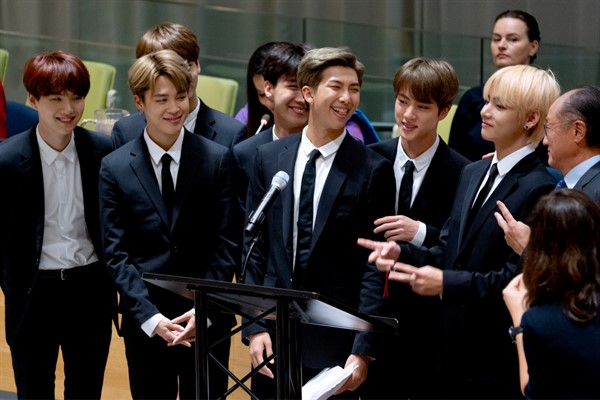When BTS performed its smash hit “Dynamite” for the first time at MTV’s Video Music Awards in August, the seven-member South Korean pop group was unable to fly to New York City for the ceremony due to the coronavirus pandemic. Instead, it intended to film its part of the show outdoors, to “show everyone the scenery in Seoul,” one of its vocalists, Jin, told Vogue. But summer rain got in the way of that plan, so it ended up recording its performance in front of giant green screens.
Seven months later, still unable to visit the U.S., the group finally realized its initial vision for showing off Seoul to an American audience—this time, at the Grammys, in what was the first solo performance by a K-pop group at the annual awards ceremony. Halfway through their prerecorded routine, BTS’ members emerged onto the spot-lit rooftop of the Parc1 skyscraper in downtown Seoul to dance amid the city lights, the Han River glinting in the background. Asked about their appearance at the Grammys by E! during a virtual red carpet interview, J-Hope, a rapper and the group’s lead dancer, said that the show was “a chance for us to show the world about Korean culture, and ourselves, and our music—so we’re really happy and we’re really proud.”
It’s not the only time that BTS has gone out of its way to highlight its Korean heritage. During a series of performances for Jimmy Fallon’s Tonight Show in September, for example, the group filmed two songs at the 14th-century Gyeongbokgung Palace in Seoul, and even wore modernized versions of traditional Korean clothing, known as hanbok, for one of them. Its latest album, “BE,” released in November, draws its sound and inspiration from old Korean classics, according to the group’s leader, RM. More blatantly, the group has been an Honorary Tourism Ambassador for Seoul for three years, and has released a series of videos and even textbooks dedicated to teaching its fans Korean.

